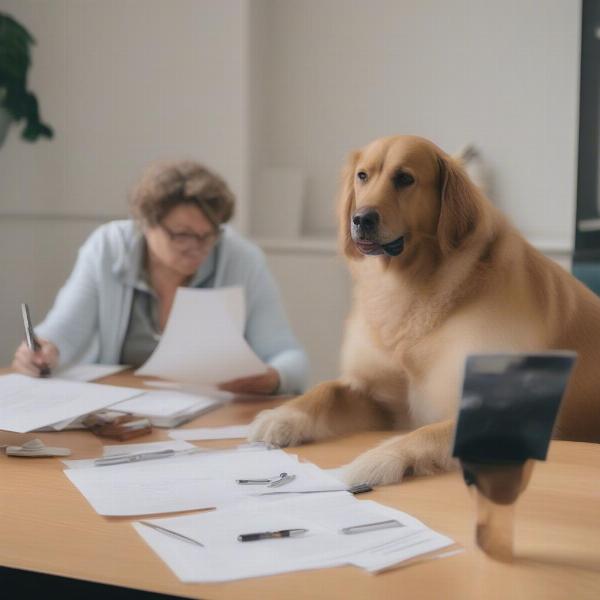Understanding the costs associated with studding a dog is crucial for responsible breeding. Whether you’re a seasoned breeder or considering offering your dog’s services for the first time, navigating the financial aspects is essential. This guide delves into the various factors influencing studding a dog fees, ensuring you’re well-informed about the process and associated costs.
Factors Influencing Studding a Dog Fees
Several key factors determine how much you can charge for your dog’s stud services. These include:
- Breed: Popular or rare breeds often command higher stud fees. For instance, French Bulldogs or English Bulldogs may have higher stud fees than a more common breed like a Labrador Retriever.
- Pedigree and Lineage: A dog with champion bloodlines or a proven track record of producing desirable offspring will likely have higher stud fees. Documented health testing and show titles play a significant role in this valuation.
- Health Testing and Certifications: Responsible breeders prioritize health. Providing comprehensive health certifications for your stud dog, such as hip and elbow scores, eye exams, and genetic testing, can justify higher studding a dog fees.
- Location: Stud fees can vary based on geographical location due to differences in demand and cost of living.
- Experience and Success: A stud dog with a history of successful litters, demonstrating proven fertility and desirable traits passed on to puppies, can command higher fees.
Negotiating and Structuring Studding a Dog Fees
Once you’ve considered the factors influencing the fee, it’s time to discuss the agreement with the dam’s owner. Here are some common approaches:
- Flat Fee: A predetermined amount paid upfront for the stud service, regardless of the litter size.
- Puppy Back Deal: Instead of a monetary fee, the stud dog owner receives a puppy from the resulting litter. This option can be beneficial for those looking to expand their breeding program.
- Combination: A combination of a flat fee and a puppy back deal. This approach offers a balance between immediate financial compensation and the potential for a valuable addition to the breeder’s lines.
 Negotiating a Stud Dog Contract
Negotiating a Stud Dog Contract
Additional Costs to Consider
Beyond the primary stud fee, other costs may be incurred:
- Travel Expenses: If the dam’s owner is located far away, travel expenses for the stud dog may need to be covered.
- Veterinary Costs: Artificial insemination or other veterinary interventions may incur additional fees.
- Boarding: If the stud dog needs to stay with the dam’s owner for a period, boarding costs should be considered.
Protecting Your Investment
A well-drafted stud contract is vital to protect both parties. The contract should clearly outline the stud fee, payment terms, health guarantees, and other crucial details.
Conclusion
Studding a dog involves careful consideration of various factors influencing the fees. By understanding these factors and structuring a clear agreement, breeders can ensure a fair and mutually beneficial arrangement. Responsible breeding practices, including health testing and a comprehensive contract, are essential for the well-being of the dogs and the future of the breed.
FAQ
- How much does it typically cost to stud a dog? Stud fees can range significantly, from a few hundred dollars to several thousand, depending on the factors discussed above.
- What if the breeding is unsuccessful? The stud contract should address this scenario, outlining whether a repeat breeding is offered or if a refund is provided.
- Is a stud contract legally binding? Yes, a well-drafted stud contract is a legally binding agreement that protects the rights and responsibilities of both parties.
- How do I find reputable stud dogs? Breed clubs, online resources, and experienced breeders can provide recommendations for reputable stud dogs.
- What health tests should my stud dog have? Recommended health tests vary by breed but often include hip and elbow evaluations, eye exams, and genetic testing.
- What information should be included in a stud contract? Stud fee, payment terms, health guarantees, breeding details, and responsibilities of both parties should be clearly outlined in the contract.
- When is the best time to stud my dog? Consult with your veterinarian to determine the optimal age and health condition for your dog to begin stud services.
About ILM Dog
ILM Dog is your trusted global resource for all things canine. We offer expert advice and practical tips on dog breeds, health, training, nutrition, grooming, and much more. Whether you’re a new dog owner or a seasoned expert, ILM Dog provides reliable information to help you provide the best possible care for your furry companion. Contact us today for expert guidance and support. Email: [email protected]. Phone: +44 20-3965-8624.